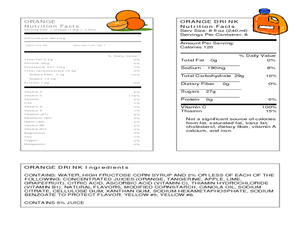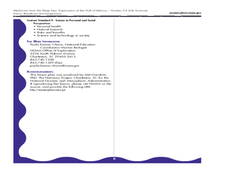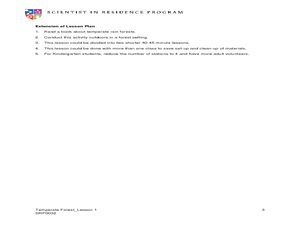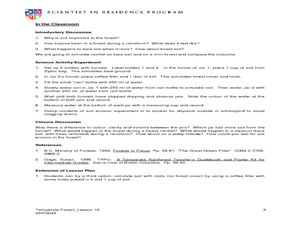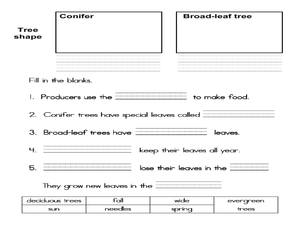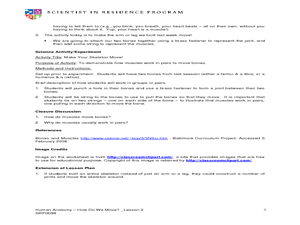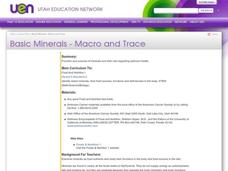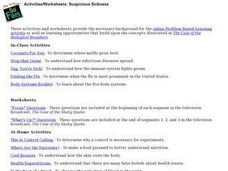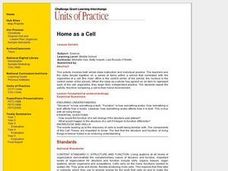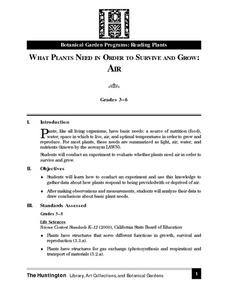Curated OER
Compost in a Bag!
Fourth graders experiment to see which objects decompose. In this compost activity, 4th graders observe the changes of labeled objects in a bag. Leave the objects for one month and record the changes by observation and weight. Students...
Curated OER
Healthy Food is Good Food!
Students examine the difference between whole foods and junk foods. In this food lesson, students learn the definitions of whole food and junk food. They find the difference in tastes and textures of different foods by performing taste...
Curated OER
Microfriends: Medicines from the Deep Sea
Learners explore the concept of beneficial microorganisms. For this microorganisms lesson, students observe different bacteria found in organisms Learners discuss and describe three ways that microorganisms benefit humans.
Curated OER
What is an Earthworm Like?
Second graders study earthworms. In this science lesson, 2nd graders observe an earthworm using a magnifying lens, draw pictures of the earthworm, and record their observations.
Curated OER
Exploring Forest Objects
Students explore the forest. In this ecosystems lesson, students rotate through sensory activity centers, brainstorm, and read about temperate forests.
Curated OER
Forest as a Filter
Learners experiment using soil and water. In this forest as a filter lesson, students identify the role of forest cover, vegetation, and foliage impacts erosion and evaporation. Learners conduct a simple experiment, form a hypothesis,...
Curated OER
Producers -- Focus on Trees
Students examine the needs of trees and plants. In this forest ecosystem lesson students use seedlings to investigate the basic necessities of plants. They discuss the consequences of these basic needs not being met.
Curated OER
Human Anatomy -- How Do We Move?
Students create a model of the digestive system. In this human anatomy instructional activity the students examine features of the digestive system. The students perform an experiment.
Curated OER
Worm Composting
Second graders discuss worm composting. In this decomposition lesson plan, 2nd graders look at the anatomy of the worm and how it eats food. They have their own worm bin and review what foods can and can not be given to the worms for...
Curated OER
What Do Plants Need?
Students experiment with plants. In this plant lesson plan, students research the needs of plants. Students determine if all plants have the same requirements for growth. In small groups, students experiment with different plants.
Curated OER
What Lives in the Open Ocean and Where Do They Live?
Young scholars explore oceanography by participating in a flash card activity. In this ocean inhabitant lesson, students define a list of ocean related vocabulary terms and answer ocean geography study questions. Young scholars utilize...
Curated OER
The Human Organism
Students identify their feelings and learn constructive ways of handling conflict. In this human mental health lesson, students identify their feelings, learn how to tell others about their feelings, and learn how to resolve conflict....
Curated OER
Earth Day
Students participate in activities that familiarize them with what Earth Day is, why it is important, and why it is a celebration.
Curated OER
Carbohydrates-Simple and Complex
Grain products are staple foods and sources of simple and complex carbohydrates that provide energy for the body. Define simple and complex carbohydrates Identify function and sources of simple and complex carbohydrates Describe how...
Curated OER
Basic Minerals - Macro and Trace
Identify minerals, their sources, functions, and deficiencies in the body. National Standard 14.2.1 Discuss macro minerals, electrolytes, and trace minerals Identify the problems associated with calcium and iron
Curated OER
Eggs: A Practical Application
Apply food selection and preparation guidelines related to egg products. National Standard 14.3.3 Identify functions of eggs: binder, thickener, coating, leavening agent, emulsifier Identify egg cooking temperatures, techniques/methods:...
Curated OER
Learning about Infectious Diseases
All of the activities and worksheets in this unit relate to learning about how infectious diseases spread & how the body deals with them. There is a collection of problem-based learning activities, as well very useful at-home...
Curated OER
SOIL
Second graders name the various materials that comprise soil, including weathered rock and other organic matter; and explain that soils differ in their color, texture, capacity to retain water, and ability to support the growth of many...
Curated OER
The Formation and Value of Temperate Grasslands
Students study the Temperate Grasslands biome of North America. They explain that it is an endangered ecosystem because the rich soils have been converted to farming in most areas. They view videos imbedded in this plan, then complete...
Curated OER
Teaching about the Effect of Photosynthesis and
Students demonstrate the effects of photosynthesis and respiration. They decide which variables to analyze in a microcosm study. They produce a written paper, oral presentation, poster, or multi-media presentation
Curated OER
You Are What You Eat (Grades 5-8)
Students gain an enhanced understanding of the relationship between proper nutrition and good health. Through use of video, hands-on activities and interaction, students measure energy in food, and recognize sources of vitamins and...
Curated OER
Home as a Cell
Students correlate a series of items with the organelles of a cell. They compare the school to a cell, and create a drawing that compares the cell structure with their home.
Curated OER
What Plants Need in Order to Survive and Grow: Air
Students conduct an experiment to determine whether plants need air in order to survive and grow. They discuss natural resources, analyze slides, and observe and record data from the experiment.
Curated OER
What Plants Need in Order to Survive and Grow: Light
Students conduct an experiment to evaluate whether plants need light to survive and grow. They observe and gather data about plant responses to different growth regimes, analyze the data, and make conclusions about basic plant needs.
Other popular searches
- Six Essential Nutrients
- Plant Growth Nutrients
- 6 Basic Nutrients
- Essential Nutrients
- Nutrients in Food
- Digestion of Nutrients
- Six Nutrients
- Plant Nutrients
- Food Nutrients
- Excess Nutrients
- Nutrients Fat
- 6 Essential Nutrients

